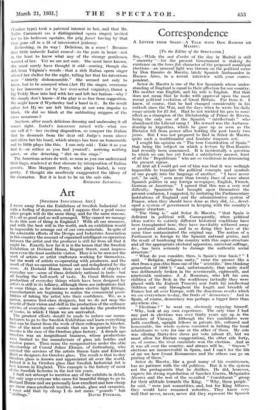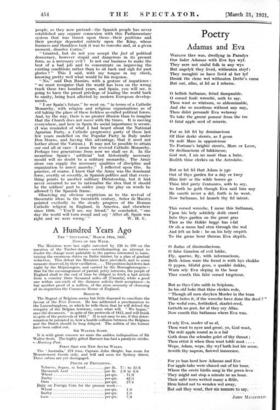Correspondence
A LETTER FROM SPAIN—A TALK WITH DON RAMIRO DR MaErru.
[To the Editor of the SPECTATOR.] Sue,—While the mot d'ordre of the day in Madrid is still " sincerity "—for the present Government is staking its existence on the bona fide character of the proposed municipal elections—an unusual light was thrown on the political scene by Don Ramiro de Maeztu, lately Spanish Ambassador in Buenos Aires, in a recent interview with your corres- pondent. Sefior de Maeztu is one of the few Spaniards whose under- standing of England is equal to their affection for our country. His mother was English, and his wife is English. But that does not mean that he looks with approval upon the most recent political evolution of Great Britain. Far from it. I knew, of course, that he had changed considerably in his outlook since the War, and the days when lie wrote his daily essay-article for El Sol. Had he not wielded his pen to some effect as a champion of the Dictatorship of Primo de Rivera, being the only one of the Spanish " intellectuals " who abandoned the Liberal camp ? His reward was the Ambassa- dorship in Argentina, which he gave up as soon as the Dictator fell from power after holding the post barely two years. But I was not prepared to find in Serior de Maeztu quite such a traditionalist and laudator temporis acti.
I sought his opinion on " The true Constitution of Spain," that being the subject on which a lecture by Don Ramiro had recently been announced. It is incidentally a question to which no one has yet found a satisfactory answer, least of all the " Republicans " who are so vociferous in denouncing the present regime.
At first all I could get out of him was that it was welinigh impossible to translate the political concepts and symbols of one people into the language of another. " I have never yet," he said, " seen more than twenty lines of sense about Spanish politics in any foreign newspaper, English, French, German or American. I agreed that this was a very real difficulty. Spaniards had brought upon themselves the present confusion, I suggested, by imitating the Parliamentary institutions of England and the administrative system of France, when they should have done as they did, i.e., devel- oped a system of government in keeping with the country's organic structure.
The thing is," said Sefior de Maeztu, " that Spain is deficient in political will. Consequently, when political ideas native to entirely different historical conditions have been transplanted here, they have inevitably withered away or produced abortions, and in so doing they have at the same time contaminated the original sap. The notion of a Parliament is foreign to the Spanish national genius,and the result of burdening the country with this super-structure and all the appropriate electoral apparatus, universal suffrage, &c., has been seriously to damage the authentic social structure."
" What do you consider, then, is Spain's true basis ? " I said. " Religion, religious unity," came the answer like a shot from a gun (this from one of the " scientific," free-thinking generation of 1898 !) " and, unfortunately, that unity itself was deliberately broken in the seventeenth, eighteenth, and nineteenth centuries. J. J. Rousseau, who left his own children of the flesh in the workhouse (actually they were placed with the Enfants Trouces) sent forth his intellectual children not only throughout the length and breadth of France but all over Europe, with the disastrous results which we see everywhere to-day, the fruits of democracy.' And in Spain, of course, democracy was perhaps a bigger farce than anywhere else. Elections ? " he went on, obviously enjoying himself. " Why, look at my own experience. The only time I had any part in elections was over thirty years ago up in the province of Vizcaya. Although the two candidates were both excellent, upright fellows in private life, cultured and honourable, the whole system consisted in bribing the local inhabitants to vote for one or the other of them. My side was offering thirty-five duros per vote (about £7, but we must allow for Iberian exaggeration), the other side forty, so, of course, the rival candidate won the election. And so it was all over the country, and always will be. " Sincere " elections are inconceivable in Spain, and I can't for the life of me see how Count Romanones and the others can go on prating of them." Sefior de Maeztu, like a good many of his countrymen, has no patience with the old politicos. But it is the system not the protagonists that he dislikes. He did, however, express his strong reprobation of Sanchez Guerra, Melquiades Alvarez and the rest of the so-called " Constituent ' group for their attitude towards the King. " Why, these people.'
he said, " were just nonentities, and, but for King Alfonso, they would have remained nobodies, They know very well that never, never, never did they represent the Spanish people, as they now pretend—the Spanish people has never established any organic connexion with this Parliamentary system that was thrust upon them—their positions and their prestige depended entirely upon the King, whose business and thankless task it was to convoke and, at a given moment, dissolve Cortes."
" Granted, but do not you accept the fact of political democracy, however stupid and dangerous in its present form, as a necessary evil ? Is not our business to make the best of a bad job and to concentrate on improving the existing conditions rather than to sit back and sigh for past glories ? " This I said, with my tongue in my cheek, knowing pretty well what would be his response. - " No," said Don Ramiro, with a gesture of impatience : we must recognize that the world has been on the wrong track these two hundred years, and Spain, you will see, is going to have the proud privilege of leading the world back to sanity, being least affected by modern European develop- ments.
" I see Spain's future," he went on, " in terms of a Catholic Monarchy, with religion and religious organizations as of old taking the place of these feckless so-called political forces. And, by the way, there is no greater illusion than to imagine that the Church does not move with the times. It is moving everywhere, and here in Spain its social importance is secure. (I was reminded of what I had heard about the National Agrarian Party, a Catholic progressive party of these last few years modelled on the Popular Party in Italy under Don Sturzo, and having this adyantage, that it need not bother about the Vatican.) It may not be possible to attain our end all at 'once—I mean the revived Catholic Monarchy. Perhaps two generations from now we shall see it. In the meantime Spain's artificial' but historically necessary mould will no doubt be a military monarchy. The Army alone can supply the necessary qualities of discipline and organization to arrest anarchy." I reflected upon this. In practice, of course, I knew that the Army was the dominant force, overtly or covertly, in Spanish politics and that every- thing points to another military Dictatorship; but it had never occurred to me to rationalize the idea that it should be the soldiers' part to solder (may the play on words be allowed ?) the Spanish frame.
Observing my obvious scepticism as to the revival of theocratic ideas in the twentieth century, Senor de Maeztu pointed excitedly to the steady progress of the Roman Catholic religion in England, in America, and elsewhere since 1900. " You'll see, my friend," he concluded, " one day the world will turn round and say After all, Spain was right and we were wrong.' " W. H. C.



















































 Previous page
Previous page